新概念英语第二册第三课(包含课文及完整课后练习)
- 格式:doc
- 大小:38.00 KB
- 文档页数:5
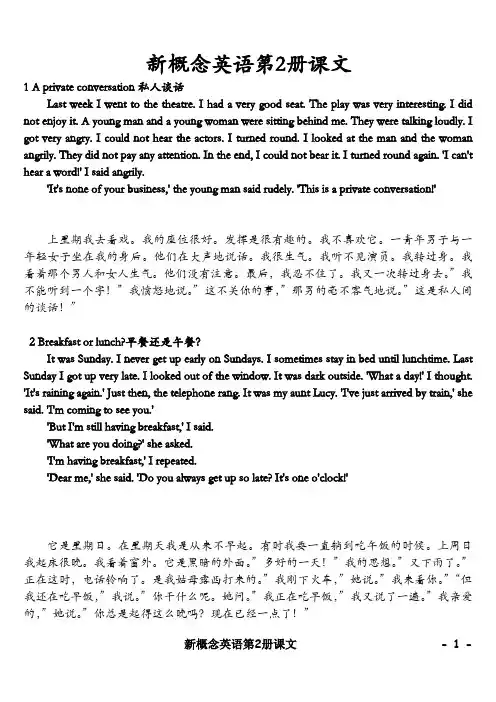
新概念英语第2册课文1 A private conversation私人谈话Last week I went to the theatre. I had a very good seat. The play was very interesting. I did not enjoy it. A young man and a young woman were sitting behind me. They were talking loudly. I got very angry. I could not hear the actors. I turned round. I looked at the man and the woman angrily. They did not pay any attention. In the end, I could not bear it. I turned round again. 'I can't hear a word!' I said angrily.'It's none of your business,' the young man said rudely. 'This is a private conversation!'上星期我去看戏。
我的座位很好。
发挥是很有趣的。
我不喜欢它。
一青年男子与一年轻女子坐在我的身后。
他们在大声地说话。
我很生气。
我听不见演员。
我转过身。
我看着那个男人和女人生气。
他们没有注意。
最后,我忍不住了。
我又一次转过身去。
”我不能听到一个字!”我愤怒地说。
”这不关你的事,”那男的毫不客气地说。
”这是私人间的谈话!”2 Breakfast or lunch?早餐还是午餐?It was Sunday. I never get up early on Sundays. I sometimes stay in bed until lunchtime. Last Sunday I got up very late. I looked out of the window. It was dark outside. 'What a day!' I thought. 'It's raining again.' Just then, the telephone rang. It was my aunt Lucy. 'I've just arrived by train,' she said. 'I'm coming to see you.''But I'm still having breakfast,' I said.'What are you doing?' she asked.'I'm having breakfast,' I repeated.'Dear me,' she said. 'Do you always get up so late? It's one o'clock!'它是星期日。
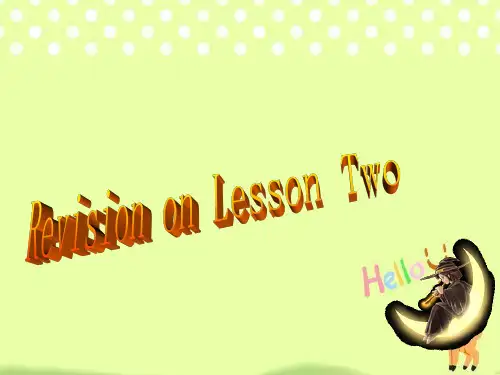
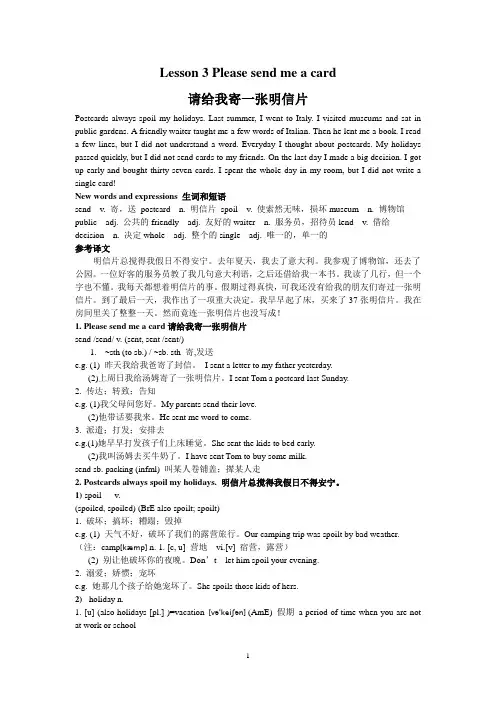
Lesson 3 Please send me a card请给我寄一张明信片Postcards always spoil my holidays. Last summer, I went to Italy. I visited museums and sat in public gardens. A friendly waiter taught me a few words of Italian. Then he lent me a book. I read a few lines, but I did not understand a word. Everyday I thought about postcards. My holidays passed quickly, but I did not send cards to my friends. On the last day I made a big decision. I got up early and bought thirty-seven cards. I spent the whole day in my room, but I did not write a single card!New words and expressions 生词和短语send v. 寄,送postcard n. 明信片spoil v. 使索然无味,损坏museum n. 博物馆public adj. 公共的friendly adj. 友好的waiter n. 服务员,招待员lend v. 借给decision n. 决定whole adj. 整个的single adj. 唯一的,单一的参考译文明信片总搅得我假日不得安宁。
去年夏天,我去了意大利。
我参观了博物馆,还去了公园。
一位好客的服务员教了我几句意大利语,之后还借给我一本书。
我读了几行,但一个字也不懂。

新概念英语第二册课后练习答案(1-20)(总10页)--本页仅作为文档封面,使用时请直接删除即可----内页可以根据需求调整合适字体及大小--新概念英语第二册课后练习答案(1~20课)Lesson 11.关键句型练习A I (1) got (2) very angry (3) .I (1) could not hear (2) the actors (3) .I (1) turned round (2) .I (1) looked at (2) the man and the woman (3) angrily (4) .They (1) did not pay (2) any attention (3) .In the end (6), I (1) could not bear (2) it (3).I (1) turned round (2) again (6) .zI (1) can't hear (2) a word (3)! {I (1) said (2) angrily (4) .zIt (1) is (2) none of your business (3) , {the young man (1) said (2) rudely (4) .zThis (1) is (2) a private conversation (3)!{B 1 I enjoyed the film yesterday.2 I listened to the news carefully.3 The man played the piano well.4 The children played games quietly in their room yesterday.5 He opened the door quietly.6 He left immediately.7 He planted a tree in the corner of the garden.8 He read the letter quickly in his office before lunch.9 I borrowed a book from the library this morning.10 The cook spoilt the soup.11 We stay at home on Sundays.12 There are a lot of people at the bus stop.13 The little boy ate greedily an apple in the kitchen this morning.14 She draws beautifully.15 I like music very much.16 They built a new school in our village last year.17 The match ended at four o'clock.18 She received a letter from her brother last week.2.多项选择题答案1 b2 c3 b4 d5 c6 a7 d 8 b 9 a 10 c 11 c 12 cLesson 22.难点练习答案1 What a wonderful garden(this is) !2 What a surprise( this is) !3 What a lot of trouble he is causing!4 What wonderful actors (they are) !5 What a hard-working woman (she is) !6 What a tall building (it is) !7 What a terrible film (it is) !8 What a clever boy you are!9 What a pretty girl (she is) !10 What a strange guy (he is) !3.多项选择题答案1 c2 d3 c4 c5 a6 b7 b 8 a 9 d 10 c 11d 12 bLesson 31.关键句型练习题A went Õvisited Õsat ÕtaughtÕlentÕread Õdid notunderstandÕthought Õpassed Õdid not send ÕmadeÕ go up Õbought Õspent Õdid n ot writeC ...Roy died last year…left me…spent a lotof money…bought one or two…never went to the cinema…stayed at home…listened tomusic…often lent CDs…they kept them…lost many CDs…2.难点练习题1 He paid some money to the shopkeeper.2 He handed the prize to me.3 The waiter brought the man a bottle of beer.4 He sold me all his books.5 The shop assistant found me some curtain material.6 He did a big favour for me.7 She showed her new hat to her husband.8 She promised the finder a reward.9 He gave some advice to his son.10 His uncle left some money to/ for him.11 He is teaching us English.12 I bought you this bunch of flowers.13 Bring me that book please.14 He offered a cigarette to me.15 Read the first paragraph to me.16 I've ordered you some soup.17 I owe a lot of money to him.18 Pass your father the mustard.3.多项选择1c 2a 3c 4a 5d 6b7c 8c 9b 10a 11b 12bLesson 121.关键句型练习答案A will sail ; shall meet ; will be ; will set out ; shall have; shallsee ; shall say ;will be ; will take partC I shall go to the theatre Reg and I shall see the first performance the producer will give a short speech. He will speak to The play will bevery people will enjoy it very much.2.难点练习答案1 He is not back yet. He will be back in ten minutes.2 A new play is on at the Globe Theatre.3 When the concert was over, We went home.4 They will set out/ off very early tomorrow morning. (Here be off is also possible.)5 You can't take the exam yet. You are not up to it.6 He will be away from home for two months.7 She swam across the English Channel and set up a new world record.3.多项选择题答案1 c2 c3 a4 d5 d6 a7 d 8 a 9 c 10 d 11 a 12 aLesson 131.关键句型练习答案A will be arriving ; will be coming ; will be meeting ; will be singing ;will be staying ; will be tryingC 1 I'll be ironing the clothes.2 The train will be arriving in a few minutes.3 We'll be seeing you in the morning.4 We'll be watching the match.5 He'll be correcting exercise books.2.难点练习答案1 It's George's.2 It's Jean's.3 It's that woman's.4 I like Keats' poetry best.5 They're the children's.6 They're the soldiers'.7 I'll leave in six hours time. 8 There was a hundred pounds' worth of damage.3多线选择答案1 b2 d3 b4 c5 a6 b7 b 8 c 9 a 10 a 11a 12 dLesson 141.关键句型练习答案A 1 I drove on to the next town after I had left a small village.2 I said good morning to him in French as soon as he had got into the car.3 I had nearly reached the town, when the young man said:BDo you speak English?C 1 After she had written the letter, she went to the post office.2 After he had had dinner, he went to the cinema.3 When I had fastened my seat belt, the plane took off.4 We did not disturb him until he had finished work.5 As soon as he had left the room, I turned on the radio.6 He had been very ill before he died.D 1 regretted 2 had begun/ began 3 arrived2.难点练习答案1 Except for2 both of3 Apart from4 askedlask for5 neither oflasked3.多项选择答案1 b2 c3 a4 c5 d6 b7 c 8 b 9 c 10 b 11 b 12 bLesson 151. 关键句型练习答案A 1a The secretary told me that Mr. Harmsworth would see me. bcMr. Harmsworth will see you. d2 a Mr. Harmsworth said that business was very bad.b cBusiness is very3 a Mr. Harmsworth told me that the firm could not afford to pay such large salaries.b cThe firm cannot afford to pay such large salaries. dB 1 told would come/would be coming2 said (had) cut3 told had never played4 did he say had done/would do5 did he tell (had) bought/would buy6 said could not7 said (had) worked8 told wrote/writes/had never written9 did you say were/had been10 said would wait2.难点练习答案1 study2 office3 nervous4 afford5 irritable3.多线选择答案1d 2b 3c 4b 5c 6d7a 8d 9c 10c 11c 12bLesson 201关键句型练习答案A Fishing; catching; catching(1. 3); having spent; fishing;fishingˆ sitting; doing C 1 he went out of the restaurant without paying the bill.2 She bought a pair of boots instead of getting a pair of shoes.3 She was afraid of spending the night alone.4 After hearing/having heard the news, she fainted.5 Think carefully before answering my question.6 On seeing the plane coming towards me, I dashed for cover.2难点练习答案1realized 2It'sˆunderstandˆits 3exciting 4interesting 5exciting6interested3多项选择答案1b 2c 3b 4b 5c 6b新概念英语第二册课后习题答案详解Lesson 21练习答案 Key to written exercises 1.关键句型练习答案A …passing planes can be heard; The airport was built ; it could not be used then(1.3); a hundred people must have been driven away; this house will be knocked d own by a passing plane; I have been offered a large sum of moneyC 1 A message will be sent immediately. 2 All these goods must be sold.3 I told you the parcel would be received in time.4 The letter has to be delivered by hand.5 Your letter must have been lost In the post. 2.难点练习答案 A (sample answers)The dog drove the sheep out of the field. The police drove the crowds back. I dr ove my car into the garage. B1 home 2 houses 3 house 4 home 3.多项选择题答案1. c根据课文第3-4行Last year, however, it came into use, 只有c. came into use recently 比较接近课文的实际内容,而其他3个选择都不符课文内容。
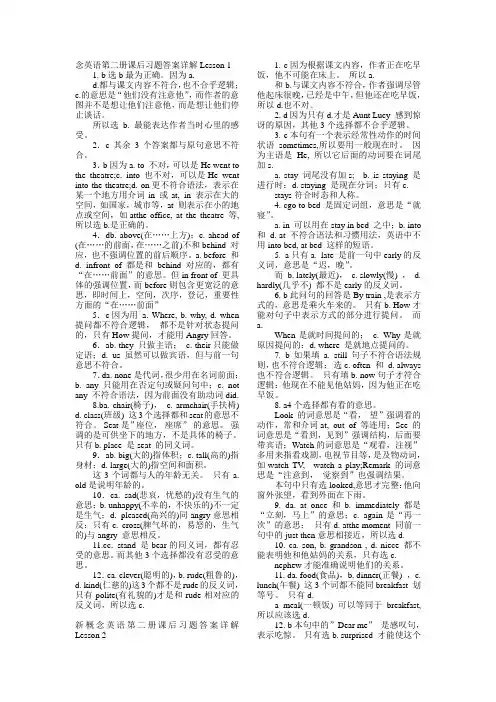
念英语第二册课后习题答案详解Lesson 11. b选b最为正确。
因为a.d.都与课文内容不符合,也不合乎逻辑;c.的意思是“他们没有注意他”,而作者的意图并不是想让他们注意他,而是想让他们停止谈话。
所以选b. 最能表达作者当时心里的感受。
2.c其余3个答案都与原句意思不符合。
3.b因为a. to 不对,可以是He went to the theatre;c. into 也不对,可以是He went into the theatre;d. on更不符合语法,表示在某一个地方用介词in 或at, in 表示在大的空间,如国家,城市等,at 则表示在小的地点或空间,如atthe office, at the theatre 等, 所以选b.是正确的。
4.db. above(在……上方);c. ahead of (在……的前面,在……之前)不和behind 对应,也不强调位置的前后顺序。
a. before 和d. infront of 都是和behind对应的,都有“在……前面”的意思。
但in front of 更具体的强调位置,而before则包含更宽泛的意思,即时间上,空间,次序,登记,重要性方面的“在……前面”5.c因为用a. Where, b. why, d. when 提问都不符合逻辑,都不是针对状态提问的,只有How提问,才能用Angry回答。
6.ab. they 只做主语; c. their只能做定语;d. us 虽然可以做宾语,但与前一句意思不符合。
7.da. none是代词,很少用在名词前面;b. any 只能用在否定句或疑问句中;c. not any 不符合语法,因为前面没有助动词did.8.ba. chair(椅子), c. armchair(手扶椅)d. class(班级) 这3个选择都和seat的意思不符合。
Seat是”座位,座席”的意思。
强调的是可供坐下的地方,不是具体的椅子。
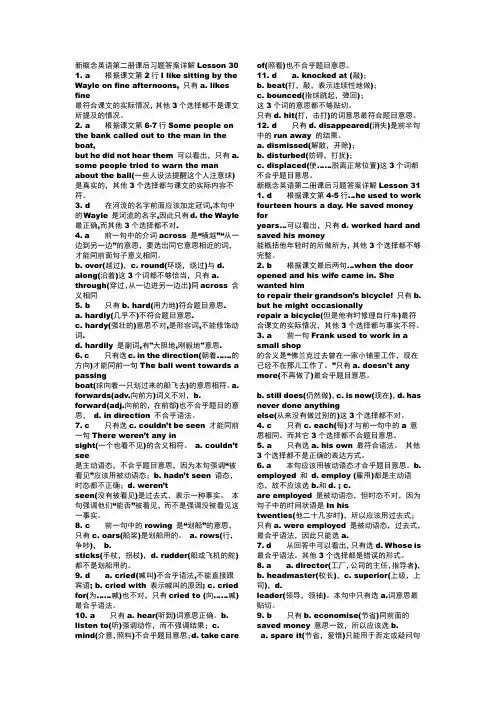
新概念英语第二册课后习题答案详解Lesson 30 1. a 根据课文第2行I like sitting by the Wayle on fine afternoons, 只有a. likes fine最符合课文的实际情况,其他3个选择都不是课文所提及的情况。
2. a 根据课文第6-7行Some people on the bank called out to the man in the boat,but he did not hear them 可以看出,只有a. some people tried to warn the man about the ball(一些人设法提醒这个人注意球)是真实的,其他3个选择都与课文的实际内容不符。
3. d 在河流的名字前面应该加定冠词,本句中的Wayle 是河流的名字,因此只有d. the Wayle 最正确,而其他3个选择都不对.4. a 前一句中的介词across 是“横越”“从一边到另一边”的意思,要选出同它意思相近的词,才能同前面句子意义相同。
b. over(越过),c. round(环绕,绕过)与d. along(沿着)这3个词都不够恰当,只有a. through(穿过,从一边进另一边出)同across 含义相同5. b 只有b. hard(用力地)符合题目意思.a. hardly(几乎不)不符合题目意思.c. hardy(强壮的)意思不对,是形容词,不能修饰动词.d. hardily 是副词,有"大胆地,刚毅地"意思.6. c 只有选c. in the direction(朝着……的方向)才能同前一句The ball went towards a passingboat(球向着一只划过来的船飞去)的意思相符。
a. forwards(adv.向前方)词义不对,b.forward(adj.向前的,在前部)也不合乎题目的意思, d. in direction 不合乎语法。
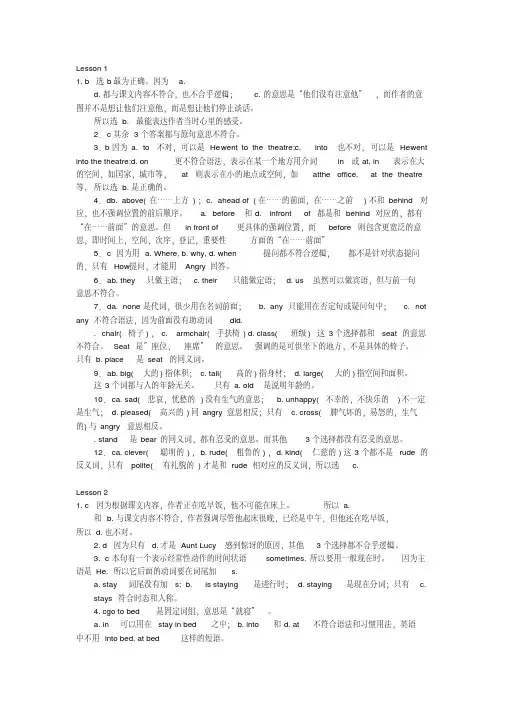
Lesson 11. b选b最为正确。
因为 a.d.都与课文内容不符合,也不合乎逻辑; c.的意思是“他们没有注意他”,而作者的意图并不是想让他们注意他,而是想让他们停止谈话。
所以选 b. 最能表达作者当时心里的感受。
2.c其余3个答案都与原句意思不符合。
3.b因为a. to 不对,可以是He went to the theatre;c. into 也不对,可以是He w ent into the theatre;d. on更不符合语法,表示在某一个地方用介词in 或at, in 表示在大的空间,如国家,城市等,at 则表示在小的地点或空间,如atthe office, at the theatre 等, 所以选 b.是正确的。
4.db. above(在……上方);c. ahead of (在……的前面,在……之前)不和behind 对应,也不强调位置的前后顺序。
a. before 和 d. infront of 都是和behind对应的,都有“在……前面”的意思。
但in front of 更具体的强调位置,而before则包含更宽泛的意思,即时间上,空间,次序,登记,重要性方面的“在……前面”5.c因为用 a. Where, b. why, d. when 提问都不符合逻辑,都不是针对状态提问的,只有How提问,才能用Angry回答。
6.ab. they 只做主语; c. their只能做定语; d. us 虽然可以做宾语,但与前一句意思不符合。
7.da. none是代词,很少用在名词前面; b. any 只能用在否定句或疑问句中; c. not any 不符合语法,因为前面没有助动词did.. chair(椅子), c. armchair(手扶椅) d. class(班级) 这3个选择都和seat的意思不符合。
Seat是”座位,座席”的意思。
强调的是可供坐下的地方,不是具体的椅子。
只有b. place 是seat 的同义词。
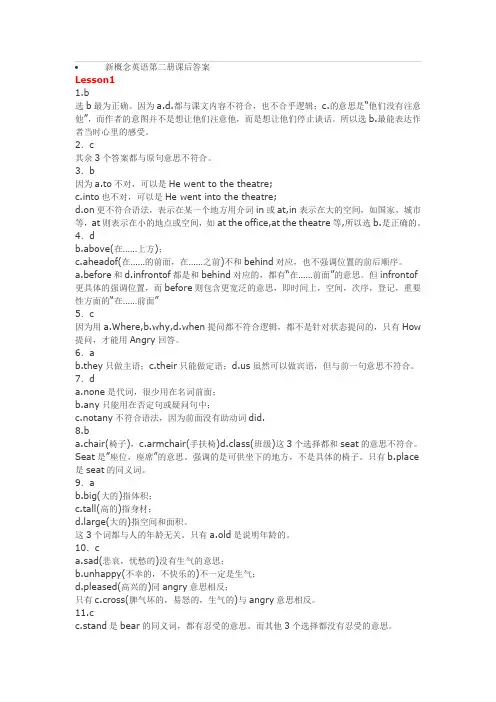
•新概念英语第二册课后答案Lesson11.b选b最为正确。
因为a.d.都与课文内容不符合,也不合乎逻辑;c.的意思是“他们没有注意他”,而作者的意图并不是想让他们注意他,而是想让他们停止谈话。
所以选b.最能表达作者当时心里的感受。
2.c其余3个答案都与原句意思不符合。
3.b因为a.to不对,可以是He went to the theatre;c.into也不对,可以是He went into the theatre;d.on更不符合语法,表示在某一个地方用介词in或at,in表示在大的空间,如国家,城市等,at则表示在小的地点或空间,如at the office,at the theatre等,所以选b.是正确的。
4.db.above(在……上方);c.aheadof(在……的前面,在……之前)不和behind对应,也不强调位置的前后顺序。
a.before和d.infrontof都是和behind对应的,都有“在……前面”的意思。
但infrontof 更具体的强调位置,而before则包含更宽泛的意思,即时间上,空间,次序,登记,重要性方面的“在……前面”5.c因为用a.Where,b.why,d.when提问都不符合逻辑,都不是针对状态提问的,只有How 提问,才能用Angry回答。
6.ab.they只做主语;c.their只能做定语;虽然可以做宾语,但与前一句意思不符合。
7.da.none是代词,很少用在名词前面;b.any只能用在否定句或疑问句中;c.notany不符合语法,因为前面没有助动词did.8.ba.chair(椅子),c.armchair(手扶椅)d.class(班级)这3个选择都和seat的意思不符合。
Seat是”座位,座席”的意思。
强调的是可供坐下的地方,不是具体的椅子。
只有b.place 是seat的同义词。
9.ab.big(大的)指体积;c.tall(高的)指身材;rge(大的)指空间和面积。
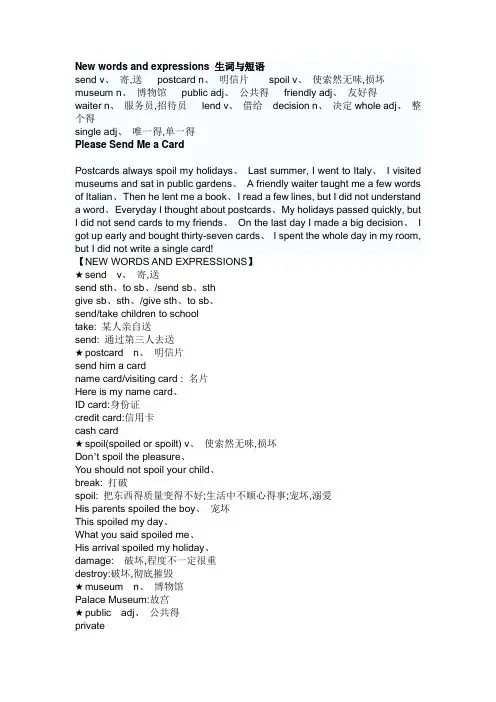
New words and expressions 生词与短语send v、寄,送postcard n、明信片spoil v、使索然无味,损坏museum n、博物馆public adj、公共得friendly adj、友好得waiter n、服务员,招待员lend v、借给decision n、决定whole adj、整个得single adj、唯一得,单一得Please Send Me a CardPostcards always spoil my holidays、Last summer, I went to Italy、I visited museums and sat in public gardens、A friendly waiter taught me a few words of Italian、Then he lent me a book、I read a few lines, but I did not understand a word、Everyday I thought about postcards、My holidays passed quickly, but I did not send cards to my friends、On the last day I made a big decision、I got up early and bought thirty-seven cards、I spent the whole day in my room, but I did not write a single card!【NEW WORDS AND EXPRESSIONS】★send v、寄,送send sth、to sb、/send sb、sthgive sb、sth、/give sth、to sb、send/take children to schooltake: 某人亲自送send: 通过第三人去送★postcard n、明信片send him a cardname card/visiting card : 名片Here is my name card、ID card:身份证credit card:信用卡cash card★spoil(spoiled or spoilt) v、使索然无味,损坏Don’t spoil the pleasure、You should not spoil your child、break: 打破spoil: 把东西得质量变得不好;生活中不顺心得事;宠坏,溺爱His parents spoiled the boy、宠坏This spoiled my day、What you said spoiled me、His arrival spoiled my holiday、damage: 破坏,程度不一定很重destroy:破坏,彻底摧毁★museum n、博物馆Palace Museum:故宫★public adj、公共得privatepublic school/place/house(pub:酒吧)in private: 私下里得in public: 公开得Why not have a conversation in public?★ Park 比较大Garden比较具有观赏价值,有不同风格得花园如Spanish garden, Italian garden private garden私家花园★friendly adj、友好得lovely adj、★waiter n、服务员,招待员waiterwaitresschief waitershop assistantattendant★ a few words 几句话I’d like to say a few words on the topic、Can I have a word with you? Have a word with sb就是固定搭配,与某人说句话★lend v、借给borrow from 向某人借lend sth、to sblend sb、sth、Can I borrow some money from you?Some people neither borrow nor lend、★decision n、决定v、decidemake a big/great decisione to a decision, arrive at a decision, reach a decision★whole adj、整个得all the、、、the whole、、、★single adj、唯一得,单一得DoubleThere wasn’t a single person on the beach、【课文讲解】The baby spoiled my night、Italian/Italy 意大利语意大利England English 英语French法语France法国German德语Germany德国Japanese日语Japan日本Spain西班牙Spanish西班牙语and 先后往往就是对等得概念teach sb、sth、a little ItalianI can speak a little English/a few words of Englishthink about: 考虑,思考think over : 仔细考虑last:表示"上一个"或"最后一个",表示"最后一个"时要加冠词theI spend the whole day in my room、spend+时间+地点I spend three hours in the sea、I spend my weekend at my mother's、I spend three hours in the classroom everyday、I spend a lot of time in traffic jam、reviewspoilsend/lend/teach sb、sth、send/lend/teach sth、to sb【Special Difficulties】翻译:1、她借了一本书给我。
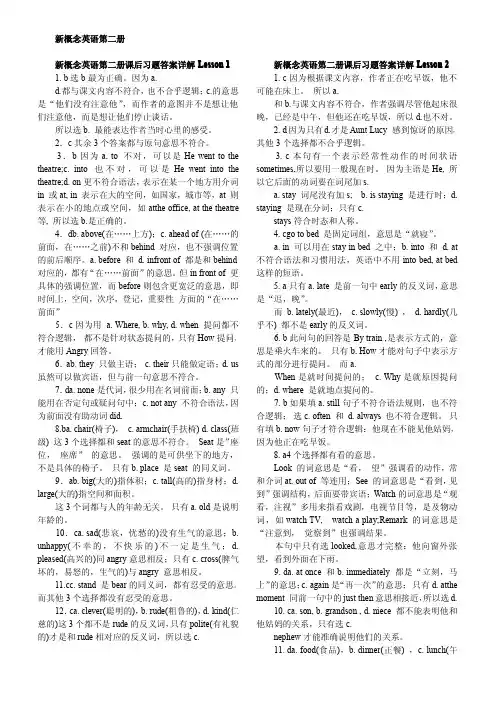
新概念英语第二册新概念英语第二册课后习题答案详解Lesson11.b选b最为正确。
因为a.d.都与课文内容不符合,也不合乎逻辑;c.的意思是“他们没有注意他”,而作者的意图并不是想让他们注意他,而是想让他们停止谈话。
所以选b.最能表达作者当时心里的感受。
2.c其余3个答案都与原句意思不符合。
3.b因为a.to不对,可以是He went to the theatre;c.into也不对,可以是He went into the theatre;d.on更不符合语法,表示在某一个地方用介词in或at,in表示在大的空间,如国家,城市等,at则表示在小的地点或空间,如atthe office,at the theatre 等,所以选b.是正确的。
4.db.above(在……上方);c.ahead of(在……的前面,在……之前)不和behind对应,也不强调位置的前后顺序。
a.before和 d.infront of都是和behind 对应的,都有“在……前面”的意思。
但in front of更具体的强调位置,而before则包含更宽泛的意思,即时间上,空间,次序,登记,重要性方面的“在……前面”5.c因为用 a.Where,b.why,d.when提问都不符合逻辑,都不是针对状态提问的,只有How提问,才能用Angry回答。
6.ab.they只做主语;c.their只能做定语; 虽然可以做宾语,但与前一句意思不符合。
7.da.none是代词,很少用在名词前面;b.any只能用在否定句或疑问句中;c.not any不符合语法,因为前面没有助动词did.8.ba.chair(椅子),c.armchair(手扶椅)d.class(班级)这3个选择都和seat的意思不符合。
Seat是”座位,座席”的意思。
强调的是可供坐下的地方,不是具体的椅子。
只有b.place是seat的同义词。
9.ab.big(大的)指体积;c.tall(高的)指身材;d. large(大的)指空间和面积。
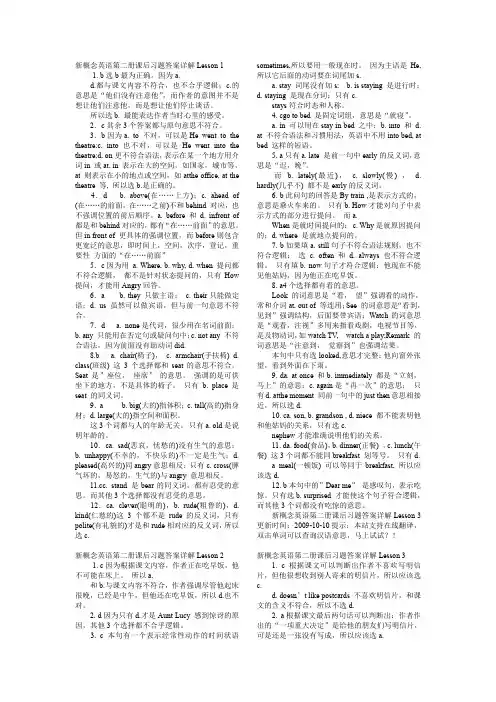
新概念英语第二册课后习题答案详解Lesson 11. b选b最为正确。
因为a.d.都与课文内容不符合,也不合乎逻辑;c.的意思是“他们没有注意他”,而作者的意图并不是想让他们注意他,而是想让他们停止谈话。
所以选b. 最能表达作者当时心里的感受。
2.c其余3个答案都与原句意思不符合。
3.b因为a. to 不对,可以是He went to the theatre;c. into 也不对,可以是He went into the theatre;d. on更不符合语法,表示在某一个地方用介词in 或at, in 表示在大的空间,如国家,城市等,at 则表示在小的地点或空间,如atthe office, at the theatre 等, 所以选b.是正确的。
4.d b. above(在……上方);c. ahead of (在……的前面,在……之前)不和behind 对应,也不强调位置的前后顺序。
a. before 和d. infront of 都是和behind对应的,都有“在……前面”的意思。
但in front of 更具体的强调位置,而before则包含更宽泛的意思,即时间上,空间,次序,登记,重要性方面的“在……前面”5.c因为用 a. Where, b. why, d. when 提问都不符合逻辑,都不是针对状态提问的,只有How 提问,才能用Angry回答。
6.a b. they 只做主语; c. their只能做定语;d. us 虽然可以做宾语,但与前一句意思不符合。
7.d a. none是代词,很少用在名词前面;b. any 只能用在否定句或疑问句中;c. not any 不符合语法,因为前面没有助动词did.8.b a. chair(椅子), c. armchair(手扶椅) d. class(班级) 这3个选择都和seat的意思不符合。
Seat是”座位,座席”的意思。
强调的是可供坐下的地方,不是具体的椅子。
新概念英语第2册课文pdf版-新概念2pdf档Lesson 1 A private conversation 私人谈话Last week I went to the theatre. I had a very good seat. The play was very interesting. I did not enjoy it. A young man and a young woman were sitting behind me. They were talking loudly.I got very angry. I could not hear the actors. I turned round. I looked at the man and the woman angrily. They did not pay any attention. In the end, I could not bear it. I turned round again. 'I can't hear a word!' I said angrily. ' It's none of your business,' the young man said rudely. 'This is a private conversation!'.Lesson 2 Breakfast or lunch? 早餐还是午餐?It was Sunday. I never get up early on Sundays. I sometimes stay in bed until lunch time.Last Sunday I got up very late. I looked out of the window. It was dark outside.'What a day!' I thought. 'It's raining again.' Just then, the telephone rang. It was my aunt Lucy.' I've just arrived by train,' she said. 'I'm coming to see you.' 'But I'm still having breakfast,' I said.'What are you doing ?' she asked. ' I'm having breakfast,' I repeated.'Dear me,' she said. 'Do you always get up so late ? It's one o'clock!''Lesson 3 Please send me a card 请给我寄一张明信片Postcards always spoil my holidays. Last summer, I went to Italy. I visited museums and sat in public gardens. A friendly waiter taught me a few words of Italian. 'Then he lent me a book. I read a few lines, but I did not understand a word. Every day I thought about postcards. My holidays passed quickly, but I did not send anycards to my friends. On the last day I made a big decision. I got up early and bought thirty-seven cards. I spent the whole day in my room, but I did not write a single card !Lesson 4 An exciting trip 激动人心的旅行I have just received a letter from my brother, Tim. He is in Australia. He has been there for six months. Tim is an engineer. He is working for a big firm and he has already visited a great number of different places in Australia. He has just bought an Australian car and has gone to Alice Springs, a small town in the centre of Australia. He will soon visit Darwin. From there, he will fly to Perth.My brother has never been abroad before, so he is finding this trip very exciting.Lesson 5 No wrong numbers 无错号之虞Mr James Scott has a garage in Silbury and now he has just bought another garage in Pinhurst. Pinhurst is only five miles from Silbury, but Mr Scott cannot get a telephone for his new garage, so he has just bought twelve pigeons. Yesterday, a pigeon carried the first message from Pinhurst to Silbury. The bird covered the distance in three minutes. Up to now, Mr Scott has sent a great many requests for spare parts and other urgent messages from one garage to the other. In this way, he has begun his own private telephone service.Lesson 6 Percy Buttons 珀西·巴顿斯I have just moved to a house in Bridge Street. Yesterdaya beggar knocked at my door. He asked me for a meal and a glass of beer. In return for this, the beggar stood on his head and sang songs. I gave him a meal. He ate the food and drank the beer. Then he put a piece of cheese in his pocket and went away. Later a neighbour told me about him. Everybody knows him. Hisname is Percy Buttons. He callsat every house in the street once a month and always asks for a meal and a glass of beer.Lesson 7 Too late 为时太晚The plane was late and detectives were waiting at the airport all morning. They were expecting a valuable parcel of diamond from South Africa. A few hours earlier, someone had told the police that thieves would try to steal the diamonds. When the plane arrived, some of the detectives were waiting inside the main building while others were waiting on the airfield. Two men took the parcel off the plane and carried it into the Customs House. While two detectives were keeping guard at the door, two others opened the parcel. To their surprise, the precious parcel was full of stones and sand!Lesson 8 The best and the worst 最好的和最差的Joe Sanders has the most beautiful garden in our town. Nearly everybody enters for 'The Nicest Garden Competition' each year, but Joe wins every time. Bill Frith's garden is larger than Joe's. Bill works harder than Joe and grows more flowers and vegetables, but Joe's gardenis more interesting. He has made neat paths and has built a wooden bridge over a pool. I like gardens too, but I do not like hard work. Every year I enter for the garden competition too, and I always win a little prize for the worst garden in the town!Lesson 9 A cold welcome 冷遇On Wednesday evening, we went to the Town Hall. It was the last day of the year and a large crowd of people had gathered under the Town Hall clock. It would strike twelve in twenty minutes' time. Fifteen minutes passed and then, at five to twelve, the clock stopped. The big minute hand did not move. We waitedand waited, but nothing happened. Suddenly someone shouted, 'It's two minutes past twelve! The clock has stopped!' I looked at my watch. It was true. The big clock refused to welcome the New Year. At that moment everybody began to laugh and sing.Lesson 10 Not for jazz 不适于演奏爵士乐We have an old musical instrument. It is called a clavichord(翼琴). It was made in Germany in 1681. Our clavichord is kept in the living-room. It has belong to ourfamily for a long time. The instrument was bought by my grandfather many years ago. Recently it was damaged by a visitor. She tried to play jazz on it! She struck the keys too hard and two of the strings were broken. My father was shocked. Now we are not allowed to touch it. It is being repaired by a friend of my father's.Lesson 11 One good turn deserves another 礼尚往来I was having dinner at a restaurant when Harry Steele came in. Harry worked in a lawyer's office years ago, but he is now working at a bank. He gets a good salary, but he always borrows money from his friends and never pays it back. Harry saw me and came and sat at the same table. He has never borrowed money from me. While he was eating, I asked him to lend me &2. To my surprise, he gave me the money immediately. 'I have never borrowed any money from you,' Harry said, 'so now you can pay for my dinner!'Lesson 12 Goodbye and good luck 再见,一路顺风Our ncighbour, Captain Charles Alison, will sail from Portsmouth tomorrow. We shall meet him at the harbour early in the morning. He will be in his small boat,Topsail.Tapsail is a famous little boat. It has sailed across the Atlantic many times. Captain Alison will set out at eight o'clockso we shall have plenty of time. We shall see his boat and then we shall say good-bye to him. He will be away for two months. We are very proud of him. He will take part in an important race across the Atlantic.Lesson 13 The Greenwood Boys 绿林少年The Greenwood Boys are a group of popular singers. At present, they are visiting all parts of the country. They will be arriving here tomorrow. They will be coming by train and most of the youngpeople in the town will be meeting them at the station. Tomorrow evening they will be singing at the Workers' Club. The Greenwood Boys will be staying for five days. During this time, they will give five performances. As usual, the police will have a difficult time. They will be trying to keep order. It is always the same on these occasions.Lesson 14 Do you speak English? 你会讲英语吗?I had an amusing experience last year. After I had lefta small village in the south of France, I drove on to thenext town. On the way, a young man waved to me. I stopped and he asked me for a lift. As soon as he had got into the car, I said good morning to him in French and he replied in the same language. Apart from a few words, I do not know any French at all. Neither of us spoke during the journey.I had nearly reached the town, when the young man suddenly said, very slowly, 'Do you speak English?' As I soon learnt, he was English himself!Lesson 15 Good news 佳音The secretary told me that Mr. Harmsworth would see me. I felt very nervous when. I went into his office. He did not look up from his desk when I entered. After I had sat down, he said thatbusiness was very bad. He told me that the firm could not afford to pay such large salaries. Twenty people had already left. I knew that my turn had come. 'Mr. Harmsworth,' I said in a weak voice. 'Don't interrupt,' he Said. Then he smiled and told me I would receive an extra &100 a year!Lesson 16 A polite request 彬彬有礼的要求If you park your car in the wrong place, a traffic policeman will soon find it. You will be very lucky if he lets you go without a ticket. However, this does not always happen. Traffic police are sometimes very polite. During a holiday in Sweden, I found this note on my car:' Sir, we welcome you to our city. This is a "No Parking" area. You will enjoy your stay here if you pay attention to our street signs. This note is only a reminder.' If you receive a request like this, you cannot fail to obey it!Lesson 17 Always young 青年常驻My aunt Jennifer is an actress. She must be at least thirty-five years old. In spite of this, she often appears on the stage as a young girl. Jennifer will have to take part in a new play soon. This time, she will be a girl of seventeen. In the play, she must appear in a bright red dress and long black stockings. Last year in another play, she had to wear short socks and a bright, orange-coloured dress. If anyone ever asked her how old she is, she always answers, 'My dear, it must be terrible to be grown up!' lesson18 He often does this!他经常干这种事!After I had had lunch at a village inn, I looked for my bag.I had left it on a chair beside the door and now it wasn't there ! As I was looking for it, the inn-keeper came in. 'Did you have a good meal ?' he asked. 'Yes, thank you,' I answered, 'but I can't pay the bill. I haven't got my bag.' The inn-keeper smiled and immediately went out. In a few minutes he returned with my bagand gave it back to me. 'I'm very sorry,' he said ' My dog had taken it into the garden. He often does this.'Lesson19 Sold out 票已售完'The play may begin at any moment,' I said.'It may have begun already,' Susan answered.'I hurried to the ticket-office. 'May I have two tickets please ?' I asked.'I'm sorry, we've sold out,' the girl said.'What a pity!' Susan exclaimed.Just then, a man hurried to the ticket-office.'Can I return these two tickets?' he asked.'Certainly,' the girl said.'Could I have those two tickets please ?' I asked.'Certainly, 'the girl said, 'but they are for next Wednesday's performance.'I might as well have them,' I said sadly.Lesson20 One man in a boat 独坐孤舟Fishing is my favourite sport. I often fish for hours without catching anything. But this does not worry me. Some fishermen are unlucky. Instead of catching fish, they catch old boots and rubbish. I am even less lucky. I never catch anything-not even old boots. After having spent whole mornings on the river, I always go home with an empty bag. 'You must give up fishing!' my friends say.' It's a waste of time.' But they don't realize one important thing. I'm not really interested in fishing. I am only interested in sitting in a boat and doing nothing at all !Lesson21 Mad or not? 是不是疯了?Aeroplanes are slowly driving me mad. I live near an airport and passing planes can be heard night and day. The airport was built during the war, but for some reason it could not be usedthen. Last year, however, it came into use. Over a hundred people must have been driven away from their homesby the noise. I am one of the few people left. Sometimes I think this house will be knocked down by a passing plane.I have been offered a large sum of money to go away, but I am determined to stay here. Everybody says I must be mad and they are probably right.Lesson22 A glass envelope 玻璃信封My daughter, Jane, never dreamed of receiving a letter from a girl of her own age in Holland. Last year, we were travelling across the Channel and Jane put a piece of paper with her name and address on it into a bottle. She threw the bottle into the sea. She never thought of it again, but ten months later, she received a letter from a girl in Holland. Both girls write to each other regularly now. However, they have decided to use the post-office. Letters will cost a litt1e more, but they will certainly travel faster.Lesson23 A new house 新居I had a letter from my sister yesterday. She lives in Nigeria. In her letter, she said that she would come to England next year. If she comes, she will get a surprise.We are now living in a beautiful new house in the country. Work on it had begun before my sister left. The house was completed five months ago. In my letter, I told her that she could stay with us. The house has many large rooms and there is a lovely garden. It is a very modern house, so it looks strange to some people. It must be the only modern house in the district.Lesson24 It could be worse 不幸中之万幸I entered the hotel manager's office and sat down. I had just lost &50 and I felt very upset.' I left the money in my room,' I said, 'and it's not there now.' The manager was sympathetic, but hecould do nothing. 'Everyone's losing money these days,' he said. He started to complain about this wicked world but was interrupted by a knock at the door.A girl came in and put an envelope on his desk. It contained &5o. 'I found this outside this gentleman's room' she said. 'Well,' I said to the manager, 'there is still some honesty in this world !'lesson25 Do the English speak English? 英国人讲的是英语吗?I arrived in London at last. The railway station was big, black and dark. I did not know the way to my hotel, so I asked a porter.I not only spoke English very carefully, but very clearly as well. The porter, however, could not understand me; I repeated my question several times and at last he understood. He answered me, but he spoke neither slowly nor clearly. 'I am a foreigner,' I said. Then he spoke slowly, but I could not understand him. My teacher never spoke English like that! The porter and I looked at each other and smiled. Then he said something and I understood it. 'You'll soon learn English!' he said. I wonder. In England, each man speaks a different language. The English understand each other, but I don't understand them ! Do they speak English ?lesson26 The best art critics 最佳美术评论家I am an art student and I paint a lot of pictures. Many people pretend that they understand modern art. They always tell you what a picture is 'about'. Of course, many pictures arc not 'about' anything. They are just pretty patterns. We like them in the same way that we like pretty curtain material. I think that young children often appreciatemodern pictures better than anyone else. They notice more. My sister is only seven, but she always tells me whether my pictures are good or not. She came into my room yesterday. ' What are you doing ?' she asked. ' I'm hanging this picture on thewall,' I answered. 'It's a new one. Do you like it ?' She looked at it critically for a moment.' It's all right,' she said, 'but isn't it upside-down ?' I looked at it again. She was right! It was!Lesson27 A wet night 雨夜Late in the afternoon, the boys put up their tent in the middle of a field. As soon as this was done, they cooked a meal over an open fire. They were all hungry and the food smelt good. After a wonderful meal, they told stories and sang songs by the camp fire. But some time later it began to rain. The boys felt tired so they pet out the fire and crept into their tent. Their sleeping-bags were warm and comfortable, so they all slept soundly. In the middle of the night, two boys woke up and began shouting. The tent was full of water! They all leapt out of their sleeping-bags and hurried outside. It was raining heavily and they found that a stream had formed in the field. The stream wound its way across the field and then flowed right under their tent!Lesson28 No parking 禁止停车Jasper White is one of those rare people who believes in ancient myths. He has just bought a new house in the city, but ever since he moved in, he has had trouble with motorists. when he returns home at night, he always finds that someone has parked a car outside his gate. Because of this, he has not been able to get his own car into his garage even once. Jasper has put up' No Parking' signs outside his gate, but these have not had any effect. Now he has put an ugly stone head over the gate. It is one of the ugliest faces I have ever seen. I asked him what it was and he told me that it was Medusa, the Gorgon. Jasper hopes that she will turn motorists to stone. But none of them has been turned to stone yet!Lesson29 Taxi! 出租汽车!Captain Ben Fawcett has bought an unusual taxi and has begun a new service. The 'taxi' is a small Swiss aeroplane called a 'Pilatus Porter'. This wonderful plane can carry sevenpassengers. The most surprising thing about it, however, is that it can land anywhere: on snow, water, or even on a ploughed field. Captain Fawcett's first passenger was a doctor who flew from Birmingham to a lonely village in the Welsh mountains. Since then, Captain Fawcett has flown passengers to many unusual places. Once he landed on the roof of a block of flats and on another occasion, he landed in a deserted car park. Captain Fawcett has just refused a strange request from a businessman. The man wanted to fly to Rockall, a lonely island in the Atlantic Ocean, but Captain Fawcett did not take him because the trip was too dangerous.Lesson30 Football or polo? 足球还是水球?The Wayle is a small river that cuts across the park near my home. I like sitting by the Wayle on fine afternoons. It was warm last Sunday, so I went and sat on the river bank as usual. Some children were playing games on the bank and there were some people rowing on the river. Suddenly, one of the children kicked a ball very hard and it went towards a passing boat. Some people on the bank called out to the man in the boat, but he did not hear them. The ball struckhim so hard that he nearly fell into the water. I turned to look at the children, but there weren't any in sight: they had all run away! The man laughed when he realized what had happened. He called out to the children and threw the ball back to the bank.Lesson31 Success story 成功者的故事Yesterday afternoon Frank Hawkins was telling me about his experiences as a young man. Frank is now the head of a verylarge business company, but as a boy he used to work in a small shop. It was his job to repair bicycles and at that time he used to work fourteen hours a day. He saved money for years and in 1938 he bought a small work-shop of his own. During the war Frank used to make spare parts for aeroplanes. At that time he had two helpers. By the end of the war, the small work-shop had become a large factory which employed seven hundred and twenty-eight people. Frank smiled when he remembered his hard early years and the long road to success. He was still smiling when the door opened and his wife came in. She wanted him to repair their son's bicycle!Lesson32 Shopping made easy 购物变得很方便People are not so honest as they once were. The temptation to steal is greater than ever before--especially in large shops. A detective recently watched a well-dressed woman who always went into a large store on Monday mornings. One Monday, there were fewer people in the shop than usual when the woman came in, so it was easier for the detective to watch her. The woman first bought a few small articles. After a little time, she chose one of the most expensive dresses in the shop and handed it to an assistant who wrapped it up for her as quickly as possible. Then the woman simply took the parcel and walked out of the shop without paying. When she was arrested, the detective found out that the shop-assistant was her daughter. The girl' gave' her mother a free dress once a week !lesson33 Out of the darkness 冲出黑暗Nearly a week passed before the girl was able to explain what had happened to her. One afternoon she set out from the coast in a small boat and was caught in a storm. Towards evening, the boat struck a rock and the girl jumped into the sea. Then sheswam to the shore after spending the whole。
新概念英语第二册复习笔记第三课课文讲解always 总是(频度副词)holidaya holiday 一天的假期holiday 较长的假期go on holiday 去度假be on holiday 正在度假holidays 较长的假期,不能指一天的假期vacation1) 法定假日(宗教假日,国家庆典)英美都用holiday。
2) 每年的例行休假(英)holiday(美)vacationleave 雇员因某种原因而获准的休假ask for a leave 请假take French leave (英)不辞而别leave in an English style (法)不辞而别Italy 意大利Italian 意大利语;意大利人public garden 公园tought me a few words of Italianteach sb sth双宾语现象:teach myself English 自学英语teach sb a lesson 教训某人一顿give sb a lesson 教训某人一顿teach sb to do sth 教某人去做某事teach fish to swin 班门弄斧teach your grandmother to suck eggs班门弄斧educate 知识和智慧全面的培养,通常由学校进行的正规教育teach 指某一学科或某种技能的各种教育课程coach 非正规的教导,可能为某一学科进行(考试)辅导或对体育运动的指导train 训练,使在行为、技能或体能上达到要求instruct 教授某人学校科目;传授某人技巧;命令word n.1) 词New words and expressions 生词和词组2) 话,语言eg. I don’t believe a word of his story. 他的故事我一句(一个字)都不相信。
3) 消息eg. Word came that he had run into trouble. 有消息传来,他陷入麻烦了。
新概念英语第二册课后习题答案详解Lesson 11. b选b最为正确。
因为a.d.都与课文内容不符合,也不合乎逻辑;c.的意思是“他们没有注意他”,而作者的意图并不是想让他们注意他,而是想让他们停止谈话。
所以选b. 最能表达作者当时心里的感受。
2.c其余3个答案都与原句意思不符合。
3.b因为a. to 不对,可以是He went to the theatre;c. into 也不对,可以是He went into the theatre;d. on更不符合语法,表示在某一个地方用介词in 或at, in 表示在大的空间,如国家,城市等,at 则表示在小的地点或空间,如atthe office, at the theatre 等, 所以选b.是正确的。
4.db. above(在……上方);c. ahead of (在……的前面,在……之前)不和behind 对应,也不强调位置的前后顺序。
a. before 和 d. infront of 都是和behind对应的,都有“在……前面”的意思。
但in front of 更具体的强调位置,而before则包含更宽泛的意思,即时间上,空间,次序,登记,重要性方面的“在……前面”5.c因为用a. Where, b. why, d. when 提问都不符合逻辑,都不是针对状态提问的,只有How提问,才能用Angry回答。
6.ab. they 只做主语;c. their只能做定语;d. us 虽然可以做宾语,但与前一句意思不符合。
7.da. none是代词,很少用在名词前面;b. any 只能用在否定句或疑问句中;c. not any 不符合语法,因为前面没有助动词did.8.ba. chair(椅子), c. armchair(手扶椅) d. class(班级) 这3个选择都和seat的意思不符合。
Seat是”座位,座席” 的意思。
强调的是可供坐下的地方,不是具体的椅子。
新概念英语第二册课后练习答案(1~20课)Lesson 11.关键句型练习A I (1) got (2) very angry (3) .I (1) could not hear (2) the actors (3) .I (1) turned round (2) .I (1) looked at (2) the man and the woman (3) angrily (4) .They (1) did not pay (2) any attention (3) .In the end (6), I (1) could not bear (2) it (3).I (1) turned round (2) again (6) .zI (1) can't hear (2) a word (3)! {I (1) said (2) angrily (4) .zIt (1) is (2) none of your business (3) , {the young man (1) said (2) rudely (4) .zThis (1) is (2) a private conversation (3)!{B 1 I enjoyed the film yesterday.2 I listened to the news carefully.3 The man played the piano well.4 The children played games quietly in their room yesterday.5 He opened the door quietly.6 He left immediately.7 He planted a tree in the corner of the garden.8 He read the letter quickly in his office before lunch.9 I borrowed a book from the library this morning.10 The cook spoilt the soup.11 We stay at home on Sundays.12 There are a lot of people at the bus stop.13 The little boy ate greedily an apple in the kitchen this morning.14 She draws beautifully.15 I like music very much.16 They built a new school in our village last year.17 The match ended at four o'clock.18 She received a letter from her brother last week.2.多项选择题答案1 b2 c3 b4 d5 c6 a7 d 8 b 9 a 10 c 11 c 12 cLesson 22.难点练习答案1 What a wonderful garden(this is) !2 What a surprise( this is) !3 What a lot of trouble he is causing!4 What wonderful actors (they are) !5 What a hard-working woman (she is) !6 What a tall building (it is) !7 What a terrible film (it is) !8 What a clever boy you are!9 What a pretty girl (she is) !10 What a strange guy (he is) !3.多项选择题答案1 c2 d3 c4 c5 a6 b7 b 8 a 9 d 10 c 11d 12 bLesson 31.关键句型练习题A went (1.1)Õvisited (1.2) Õsat(1.2) Õtaught(1.2)ÕlentÕread(1.3) Õdid notunderstandÕthought (1.4)Õpassed (1.5) Õdid not send(1.5) ÕmadeÕ go up (1.6) Õbought (1.7) Õspent(1.7) Õdid not write(1.8)C ...Roy died last year…left me…spent a lotof money…bought one or two…never went to the cinema…stayed at home…listened tomusic…often lent CDs…they kept them…lost many CDs…2.难点练习题1 He paid some money to the shopkeeper.2 He handed the prize to me.3 The waiter brought the man a bottle ofbeer.4 He sold me all his books.5 The shop assistant found me some curtain material.6 He did a big favour for me.7 She showed her new hat to her husband.8 She promised the finder a reward.9 He gave some advice to his son.10 His uncle left some money to/ for him.11 He is teaching us English.12 I bought you this bunch of flowers.13 Bring me that book please.14 He offered a cigarette to me.15 Read the first paragraph to me.16 I've ordered you some soup.17 I owe a lot of money to him.18 Pass your father the mustard.3.多项选择1c 2a 3c 4a 5d 6b7c 8c 9b 10a 11b 12bLesson 121.关键句型练习答案A will sail (1.1); shall meet (1.2); will be (1.3); will set out (11.4-5); shall have(1.5); shallsee (1.5); shall say (1.6);will be (1.6); will take part (1.7)C I shall go to the theatre Reg and I shall see the firstperformance the producer will give a short speech. He will speak to The play will bevery people will enjoy it very much.2.难点练习答案1 He is not back yet. He will be back in ten minutes.2 A new play is on at the Globe Theatre.3 When the concert was over, We went home.4 They will set out/ off very early tomorrow morning. (Here be off is also possible.)5 You can't take the exam yet. You are not up to it.6 He will be away from home for two months.7 She swam across the English Channel and set up a new world record. 3.多项选择题答案1 c2 c3 a4 d5 d6 a7 d 8 a 9 c 10 d 11 a 12 aLesson 131.关键句型练习答案A will be arriving (1.2); will be coming (1.3); will be meeting (1.4); will be singing (1.5);will be staying (1.6); will be trying (1.8)C 1 I'll be ironing the clothes.2 The train will be arriving in a few minutes.3 We'll be seeing you in the morning.4 We'll be watching the match.5 He'll be correcting exercise books.2.难点练习答案1 It's George's.2 It's Jean's.3 It's that woman's.4 I like Keats' poetry best.5 They're the children's.6 They're the soldiers'.7 I'll leave in six hours time. 8 There was a hundred pounds' worth of damage.3多线选择答案1 b2 d3 b4 c5 a6 b7 b 8 c 9 a 10 a 11a 12 dLesson 141.关键句型练习答案A 1 I drove on to the next town after I had left a small village.2 I said good morning to him in French as soon as he had got into the car.3 I had nearly reached the town, when the young man said:BDo you speak English?C 1 After she had written the letter, she went to the post office.2 After he had had dinner, he went to the cinema.3 When I had fastened my seat belt, the plane took off.4 We did not disturb him until he had finished work.5 As soon as he had left the room, I turned on the radio.6 He had been very ill before he died.D 1 regretted 2 had begun/ began 3 arrived2.难点练习答案1 Except for2 both of3 Apart from4 askedlask for5 neither oflasked3.多项选择答案1 b2 c3 a4 c5 d6 b7 c 8 b 9 c 10 b 11 b 12 bLesson 151. 关键句型练习答案A 1a The secretary told me that Mr. Harmsworth would see me.bcMr. Harmsworth will see you. d2 a Mr. Harmsworth said that business was very bad.b cBusiness is very bad.d3 a Mr. Harmsworth told me that the firm could not afford to pay such large salaries.b cThe firm cannot afford to pay such large salaries. dB 1 told would come/would be coming2 said (had) cut3 told had never played4 did he say had done/would do5 did he tell (had) bought/would buy6 said could not7 said (had) worked8 told wrote/writes/had never written9 did you say were/had been10 said would wait2.难点练习答案1 study2 office3 nervous4 afford5 irritable3.多线选择答案1d 2b 3c 4b 5c 6d7a 8d 9c 10c 11c 12bLesson 201关键句型练习答案A Fishing(1.1); catching(11.1-2); catching(1. 3); having spent(1.5); fishing(1.6);fishingˆ sitting(1.8); doing (1.9) C 1 he went out of the restaurant without paying the bill.2 She bought a pair of boots instead of getting a pair of shoes.3 She was afraid of spending the night alone.4 After hearing/having heard the news, she fainted.5 Think carefully before answering my question.6 On seeing the plane coming towards me, I dashed for cover.2难点练习答案1realized 2It'sˆunderstandˆits 3exciting 4interesting 5excit ing 6interested3多项选择答案1b 2c 3b 4b 5c 6b新概念英语第二册课后习题答案详解Lesson 21练习答案 Key to written exercises 1.关键句型练习答案A …passing planes can be heard(1.2); The airport was built (1.2); it could not be used then(1. 3); a hun dred people must have been driven away(11.4-5); this house will be knocked down by a passing pl ane(11.6-7); I have been offered a large sum of money(1.7)C 1 A message will be sent immediately. 2 All these goods must be sold.3 I told you the parcel would be received in time.4 The letter has to be delivered by hand.5 Your l etter must have been lost In the post. 2.难点练习答案 A (sample answers)The dog drove the sheep out of the field. The police drove the crowds back. I drove my car into th e garage. B1 home 2 houses 3 house 4 home 3.多项选择题答案1. c根据课文第3-4行Last year, however, it came into use, 只有c. came into use recently 比较接近课文的实际内容,而其他3个选择都不符课文内容。
新概念英语第二册课后练习答案(1~20课)Lesson 11.关键句型练习A I (1) got (2) very angry (3) .I (1) could not hear (2) the actors (3) .I (1) turned round (2) .I (1) looked at (2) the man and the woman (3) angrily (4) . They (1) did not pay (2) any attention (3) .In the end (6), I (1) could not bear (2) it (3).I (1) turned round (2) again (6) .zI (1) can't hear (2) a word (3)! {I (1) said (2) angrily (4) .zIt (1) is (2) none of your business (3) , {the young man (1) said (2) rudely (4) .zThis (1) is (2) a private conversation (3)!{B 1 I enjoyed the film yesterday.2 I listened to the news carefully.3 The man played the piano well.4 The children played games quietly in their room yesterday.5 He opened the door quietly.6 He left immediately.7 He planted a tree in the corner of the garden.8 He read the letter quickly in his office before lunch.9 I borrowed a book from the library this morning.10 The cook spoilt the soup.11 We stay at home on Sundays.12 There are a lot of people at the bus stop.13 The little boy ate greedily an apple in the kitchen this morning.14 She draws beautifully.15 I like music very much.16 They built a new school in our village last year.17 The match ended at four o'clock.18 She received a letter from her brother last week. 2.多项选择题答案1 b2 c3 b4 d5 c6 a7 d 8 b 9 a 10 c 11 c 12 cLesson 22.难点练习答案1 What a wonderful garden(this is) !2 What a surprise( this is) !3 What a lot of trouble he is causing!4 What wonderful actors (they are) !5 What a hard-workingwoman (she is) !6 What a tall building (it is) !7 What a terrible film (it is) !8 What a clever boy you are!9 What a pretty girl (she is) !10 What a strange guy (he is) !3.多项选择题答案1 c2 d3 c4 c5 a6 b7 b 8 a 9 d 10 c 11d 12 bLesson 31.关键句型练习题A went (1.1)Õvisited (1.2) Õsat(1.2) Õtaught(1.2)ÕlentÕread(1.3) Õdid notunderstandÕthought (1.4)Õpassed (1.5) Õdid not send(1.5) ÕmadeÕgo up (1.6) Õbought (1.7) Õspent(1.7) Õdid not write(1.8)C ...Roy died last year…left me…spent a lotof money…bought one or two…never went to the cinema…stayed at home…listened tomusic…often lent CDs…they kept them…lost many CDs… 2.难点练习题1 He paid some money to the shopkeeper.2 He handed the prize to me.3 The waiter brought the man a bottle of beer.4 He sold me all his books.5 The shop assistant found me some curtain material.6 He did a big favour for me.7 She showed her new hat to her husband.8 She promised the finder a reward.9 He gave some advice to his son.10 His uncle left some money to/ for him.11 He is teaching us English.12 I bought you this bunch of flowers.13 Bring me that book please.14 He offered a cigarette to me.15 Read the first paragraph to me.16 I've ordered you some soup.17 I owe a lot of money to him.18 Pass your father the mustard.3.多项选择1c 2a 3c 4a 5d 6b7c 8c 9b 10a 11b 12bLesson 121.关键句型练习答案A will sail (1.1); shall meet (1.2); will be (1.3); will set out (11.4-5); shall have(1.5); shallsee (1.5); shall say (1.6);will be (1.6); will take part (1.7) C I shall go to the theatre Reg and I shall see the first performance the producer will give a short speech. He will speak to The play will bevery people will enjoy it very much.2.难点练习答案1 He is not back yet. He will be back in ten minutes.2 A new play is on at the Globe Theatre.3 When the concert was over, We went home.4 They will set out/ off very early tomorrow morning. (Here be off is also possible.)5 You can't take the exam yet. You are not up to it.6 He will be away from home for two months.7 She swam across the English Channel and set up a new world record.3.多项选择题答案1 c2 c3 a4 d5 d6 a7 d 8 a 9 c 10 d 11 a 12 aLesson 131.关键句型练习答案A will be arriving (1.2); will be coming (1.3); will be meeting(1.4); will be singing (1.5);will be staying (1.6); will be trying (1.8)C 1 I'll be ironing the clothes.2 The train will be arriving in a few minutes.3 We'll be seeing you in the morning.4 We'll be watching the match.5 He'll be correcting exercise books.2.难点练习答案1 It's George's.2 It's Jean's.3 It's that woman's.4 I like Keats' poetry best.5 They're the children's.6 They're the soldiers'.7 I'll leave in six hours time. 8 There was a hundred pounds' worth of damage.3多线选择答案1 b2 d3 b4 c5 a6 bLesson 141.关键句型练习答案A 1 I drove on to the next town after I had left a small village.2 I said good morning to him in French as soon as he had got into the car.3 I had nearly reached the town, when the young man said: BDo you speak English?C 1 After she had written the letter, she went to the post office.2 After he had had dinner, he went to the cinema.3 When I had fastened my seat belt, the plane took off.4 We did not disturb him until he had finished work.5 As soon as he had left the room, I turned on the radio.6 He had been very ill before he died.D 1 regretted 2 had begun/ began 3 arrived2.难点练习答案1 Except for2 both of3 Apart from4 askedlask for5 neither oflasked3.多项选择答案1 b2 c3 a4 c5 d6 bLesson 151. 关键句型练习答案A 1a The secretary told me that Mr. Harmsworth would see me. bcMr. Harmsworth will see you. d2 a Mr. Harmsworth said that business was very bad.b cBusiness is very bad.d3 a Mr. Harmsworth told me that the firm could not afford to pay such large salaries.b cThe firm cannot afford to pay such large salaries. dB 1 told would come/would be coming2 said (had) cut3 told had never played4 did he say had done/would do5 did he tell (had) bought/would buy6 said could not7 said (had) worked8 told wrote/writes/had never written9 did you say were/had been10 said would wait2.难点练习答案1 study2 office3 nervous4 afford5 irritable3.多线选择答案1d 2b 3c 4b 5c 6d7a 8d 9c 10c 11c 12bLesson 201关键句型练习答案A Fishing(1.1); catching(11.1-2); catching(1. 3); having spent(1.5); fishing(1.6);fishingˆ sitting(1.8); doing (1.9) C 1 he went out of the restaurant without paying the bill.2 She bought a pair of boots instead of getting a pair of shoes.3 She was afraid of spending the night alone.4 After hearing/having heard the news, she fainted.5 Think carefully before answering my question.6 On seeing the plane coming towards me, I dashed for cover. 2难点练习答案1realized 2It'sˆunderstandˆits 3exciting 4interesting 5exciting 6interested3多项选择答案1b 2c 3b 4b 5c 6b新概念英语第二册课后习题答案详解Lesson 21练习答案Key to written exercises 1.关键句型练习答案A …passing planes can be heard(1.2); The airport was built (1.2); it co uld not be used then(1. 3); a hundred people must have been driven away(11.4-5); this house will be knocked down by a passing plane(11 .6-7); I have been offered a large sum of money(1.7)C 1 A message will be sent immediately. 2 All these goods must be sold.3 I told you the parcel would be received in time.4 The letter h as to be delivered by hand.5 Your letter must have been lost In the post. 2.难点练习答案 A (sample answers)The dog drove the sheep out of the field. The police drove the cro wds back. I drove my car into the garage. B1 home 2 houses 3 house 4 home 3.多项选择题答案1. c根据课文第3-4行Last year, however, it came into use, 只有c. came into use recently 比较接近课文的实际容,而其他3个选择都不符课文容。
新东方新概念英语第二册课后习题答案详解/html/2/xiangjie/list_81_2.html第13课、新东方新概念英语第二册课后习题答案详解Lesson 131. b根据课文第3-4行They will be coming…and most of the young people in town will…,只有b. mainly the young people 与课文内容相符合,而其他3个选择都不符合课文内容。
2. d根据文章第7-8行...the police will have a difficult time, they will be trying to keep order.只有d. to prevent trouble(防止麻烦)最符合文章的意思,它说明警察去那的目的,而其它3个选择都表示原因,不能准确表达文章的含义。
3. b需要选同前面句子中的most of (大多数)意思相近的词或短语。
a. A lot(许多)后面应该有of, 与most of 意思不同;c. Some(一些)不是most of 的同义词,语法上也讲不通;d. Many(许多)也不是most of 的同义词,且有语法错误;只有b. Nearly all(几乎所有的)同most of 的意思最接近,也最符合语法。
4. c只有 c. long will they be 最符合语法和题目意思。
a. long they will be 不是疑问句形式,不合乎语法规则;b. they will be 不合乎语法,也不合乎题目意思;d. long they be 不合乎语法。
5. a只有a.in才最接近前面句子中的 during 的含义,而其他3个选择都在意思上讲不通。
6. b只有b. as usual(通常)才能使这个句子意思完整,语法正确,而其他3个选择都不符合习惯用法和语法。
7. b这个句子的主语police(警察)是表示复数意义的名词,因此它后面的谓语动词应该是复数形式的。
Lesson 3 Please send me a card 请给我寄一张明信片 First listen and then answer the question.听录音,然后回答以下问题。 How many cards did the writer send
Postcards always spoil my holidays. Last summer, I went to Italy. I visited museums and sat in public gardens. A friendly waiter taught me a few words of Italian. Then he lent me a book. I read a few lines, but I did not understand a word. Everyday I thought about postcards. My holidays passed quickly, but I did not send cards to my friends. On the last day I made a big decision. I got up early and bought thirty-seven cards. I spent the whole day in my room, but I did not write a single card!
New words and expressions 生词和短语 send v. 寄,送 friendly adj. 友好的
。 postcard n. 明信片 waiter n. 服务员,招待员
spoil v. 使索然无味,损坏 lend v. 借给 museum n. 博物馆 decision n. 决定 public adj. 公共的 single adj. 唯一的,单一的 whole adj. 整个的
Note on the text 课文注释 1 a few words,几句话。 2 lent me a book中,lent是“借出”的意思。我们常说lend sb. sth 或lend sth to sb.。borrow是“借入”的意思,常用的结构是borrow sth.或borrow sth. from sb.
" 参考译文
明信片总搅得我假日不得安宁。去年夏天,我去了意大利。我参观了博物馆,还去了公园。一位好客的服务员教了我几句意大利语,之后还借给我一本书。我读了几行,但一个字也不懂。我每天都想着明信片的事。假期过得真快,可我还没有给我的朋友们寄过一张明信片。到了最后一天,我作出了一项重大决定。我早早起了床,买来了37张明信片。我在房间里关了整整一天。然而竟连一张明信片也没写成!
Summary writing 摘要写作 Answer these questions in not more than 50 words. 回答下列问题,将答案组成一个段落,不要超过50个单词。 1 Do postcards always spoil the writer’s holiday or not 2 Where did he spend his holidays last summer 3 What did he think about every day 4 Did he send any cards to his friends or not 5 |
6 What is the writer’s big decision 7 Where did he stay all day 8 Did he write any cards or not Key structures 关键句型 What happened 一般过去时 Read this short conversation. Pay close attention to the verbs in italics. Each of these verbs tells us what happened. 读一读下面的这段对话,要特别注意用斜体印出的动词,每个动词都告诉我们发生了什么事。
POLICEMAN: Did you see the accident, sir * 先生,你看到那个事故吗
MAN: Yes, I did. The driver of that car hit that post over there. 是的,我看到了。那辆车的司机撞到那边的杆子上。 POLICEMAN: What happened 发生了什么事情 MAN: A dog ran across the road and the driver tried to avoid it. The car suddenly came towards me. It climbed on to the pavement and crashed into that post. 一条狗穿过马路,那位司机企图躲开狗。突然,汽车朝我开过来。它走上人行道,撞到那根杆子上。 POLICEMAN: What did you do 你做了什么 MAN: I ran across the street after the dog.
【 我穿过马路去追狗。
POLICEMAN: Why did you do that Were you afraid of the car 你为什么这样做呢你怕汽车吗 MAN: I wasn’t afraid of the car. I was afraid of the driver. The driver got out of the car and began shouting at me. He was very angry with me. You see, it was my dog. 我不怕汽车,我怕那个司机。他下了车,开始朝我喊了起来。他对我很生气。你知道的,那是我的狗。
Exercises 练习 A Look at the passage ‘Please send me a card’ . Put a line under all the verbs which tell us what happened to the writer when he was on holiday in Italy. 重读课文,找出那些说明作者在意大利度假时所发生的事情的动词,在这些动词的下面划上横线。
!
B Give the correct form of all the verbs in parentheses. Do not refer to the passage until you finish the exercise. 用括号中的动词的正确形式填空,完成练习后再对照课文,核对你的答案。 Last summer, I (go) to Italy. I (visit) museums and (sit) in public gardens. A friendly waiter ( teach) me a few words of Itanlian. Then he (lend) me a book. I (read) a few lines, but I (not understand) a word. Every day I (think) about postcards. My holidays (pass) quickly, but I (not send) cards to my friends. On the last day, I (make) a decision. I (get) up early and (buy) thirty-seven cards. I (spend) the whole day in my
[ room, but I (not write) a single card!
C Give the correct form of the verbs in parentheses in the passage below. Each verb must tell us what happened. 用括号中动词的正确形式填空,每个动词都必须告诉我们发生了什么事情。 My friend, Roy, (die) last year. He (leave) me his CD player and his collection of CDs. Roy (spend) a lot of money on CDs. He (buy) one or two CDs every week. He never (go) to the cinema or to the theatre. He (stay) at home every evening and (listen) to music. He often (lend) CDs to his friends. Sometimes they (keep) them. He (lose) many CDs in this way.
. Special difficulties 难点
英语中有些动词可以带两个宾语,这些动词大多具有“给予”的含义。如课文中第3行的句子 “He lent me a book” 中,动词lent后面带有表示动作结果的直接宾语( a book) 和表示动作目标的间接宾语(me). 间接宾语在大多数情况下置于直接宾语之前,如果间接宾语在后,间接宾语前必须加“to”或(表示动作为什么人而做) “for”. 因此,课文中的句子也可以改成:He lent a book to me. 注意一下例句。 Instead of saying: We can say: 除了这种表达方法外: 还可以说: He lent me a book. He lent a book to me. He sent me a card. He sent a card to me. He passed me the salt. He passed the salt to me. She bought me a tie. She bought a tie for me. She made me a cake. She made a cake for me.
Exercise 练习 Write each of the following sentences in a different way. 改写以下句子。 1 He paid the shopkeeper some money. 2 He handed me the prize. 3 The writer brought a bottle of beer to the man. 4 He sold all his books to me. 5 The shop assistant found some curtain material for me. 6 He did me a big favour. , 7 She showed her husband her new hat.